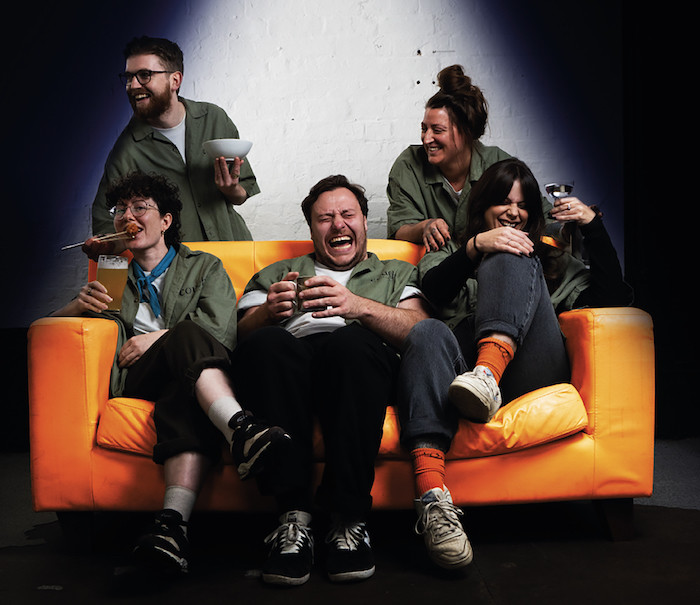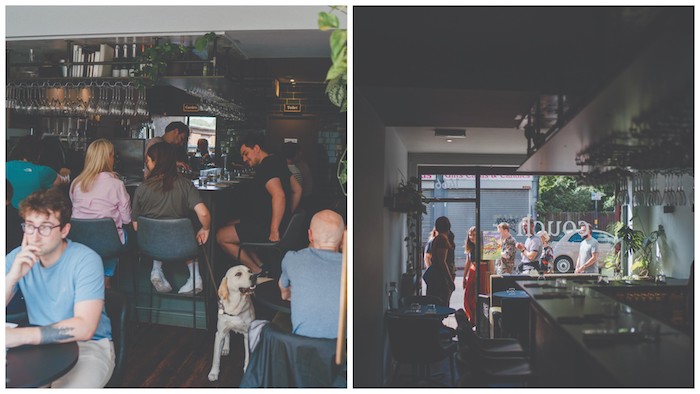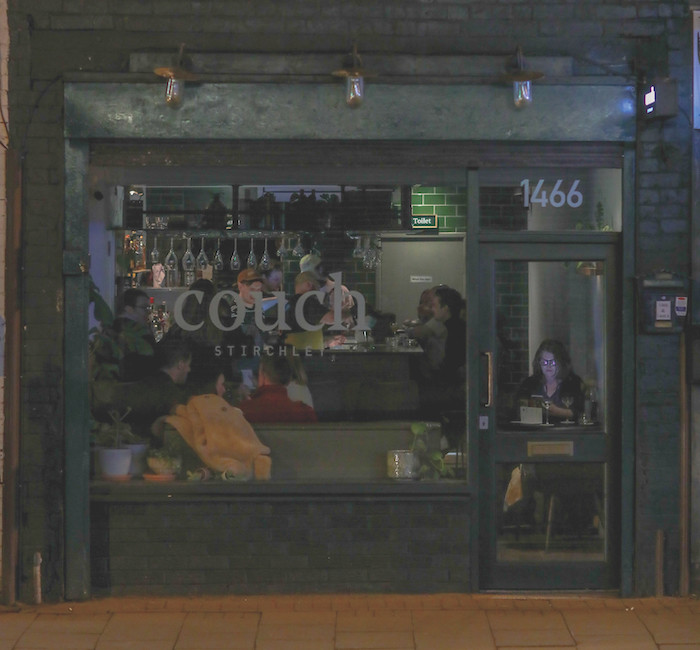
Couch is a local bar that’s become big nationally. Hamish Smith talks to owners Katie Rouse and Jacob Clarke about how to connect with community.
The butchers, the bakers, the cocktail makers… how the local high street has changed. And the best thing about the rise of neighbourhood bars across the nation – what’s really made an impact on our drinking habits – is that they are increasingly very good.
I don’t know about you, but when you have a bar five minutes from your door making world-class drinks, it does make you think twice about going into town. More than that, good neighbourhood bars tap into that lockdown sensibility – laziness yes, but also the desire to be more connected locally.
Few do neighbourhood better than Couch in Stirchley, five miles from Birmingham city centre. The team here certainly don’t mind if you haven’t done your hair – in fact, they might not have either. Here you have a bar which knows why it exists – who it’s for. The after-work drinker, the dog walker, the head-in-the-door local worker – they all get the same warm Norm-from-Cheers welcome.
And somehow, in the five years since launching, this bar in the backwaters of Birmingham, has grown a national reputation – it’s a regular finalist at the Class Bar Awards. How has it managed it? Well, Couch thinks about drinks like it’s a destination bar in town, but everything else – inclusive everyman vibe, authentic service – is geared to Stirchley. It looks nothing like a pub but it performs a similar role to the community boozer.

Images: Lee Allen
Team Couch
So, let’s meet the team. Couch has two owners, Katie Rouse and partner (in marriage and business) Jacob Clarke. Both are Birmingham’s own, but Rouse grew up in none other than Stirchley. She remembers too well the kind of high street that existed back then. “The Laser Quest was unreal, but there weren’t many businesses open back then,” she says. “There was some crime – I wasn’t allowed to walk down the high street until I was in my late teens. It’s crazy to think how it was then. Now it has the most incredible community – I couldn’t feel more safe.”
Rouse met Clarke on the job. “We met at The Victoria, where I used to wear waistcoats and a flat cap – Katie hated me,” says Clarke. “He also hated me,” replies Rouse. “I was the strict manager who wanted to loosen up a bit and he was the young cocky bartender.” Let’s just say things progressed from there – a bar together was destiny.
And what was created in 2019 was Couch – and where else but Rouse’s own Stirchley? This was just months before the pandemic, which would both tear their business apart and bring their community together. Business owners became friends became customers. Among them Lee Allen and Lisa Brown, AKA Hank & Margot, local Stirchley photographers who offered their services to a high street in need. Who else would we ask to take our photographs but them?
Like so many debut bars, Rouse and Clarke’s would be a remedy to industry ills. “All the things that we felt were wrong with hospitality and caused us to be disillusioned we endeavoured not to do at Couch,” says Clarke. First of all, Couch is run in an inclusive way. Rouse and Clarke don’t label it as a gay bar per se, but the rainbow flag at the front certainly lets the LGBT+ community know they’re in a safe place, while simultaneously deterring dickheads – win win. The team – many of whom are also queer – approach everything from service style to music through this inclusive lens.
Rouse and Clarke also wanted to create a culture that promoted healthy attitudes towards work. “Everyone is salaried and does no more than 42 hours a week,” says Rouse. “No one does doubles and takeovers are counted as shifts.” Clarke adds: “Your team is your first impression of any bar – why would you want to overwork and tire your strongest assets.”
Team balance
The team – now numbering six – has evolved slowly over the past five years, which is always a good sign. There’s Rouse, Clarke and Danny Pope, who’ve been there since the opening credits. Courtney Francis joined a couple of years ago and Joe Beardsmore is their latest. When they’ve had to hire, they’ve put a lot of time into finding the right people. “We refuse to panic recruit – we waited for five or six months for Courtney,” says Clarke. Francis – the winner of Emerging Bartender of the Year in 2023 at the Class Bar Awards – was a major coup for a neighbourhood bar. But that doesn’t mean Rouse and Clarke are assembling a team of star-tenders – in fact there are no job roles at all. “We purposefully pick people who are different to one another so we fill each other’s gaps of knowledge,” says Rouse. “We want to showcase their personalities. Someone might be amazing with content, someone else drinks creation, classics or spirits education – we all mentor each other. Although Jabob and I are the owners, we don’t like having a hierarchy.”
Without the data, this is a moneyball approach for bars – a team selected on what they can do, not what they can’t. Get the combination of talents right and you have a winning team. “Katie’s hospitality is subtle, she makes sure everyone has what they want, but won’t be loud about it,” says Clarke. “Danny reads the room like no one I’ve ever known in my life and delivers in funny, unpredictable ways. I’m theatrical and jokey so together at the bar Danny and I are barmy. Courtney’s ability to profile flavour is brilliant – Katie and Courtney are powerhouses at developing menus. Joey has a real keen eye for details around the venue. He’s got a nerdy brain for spirits too.”

Image credit Tom Bird
This variety of personality types means their service can adapt to different customers and still be authentic. “Katie’s had shifts where she’s got a group who are clearly looking for a bit of entertainment and wants to swap with me,” says Clarke. “I might serve a table and realise they’re sick of me after 10 seconds. Katie will go over and say: ‘I’m so sorry about my husband’.”
Evening walkers
Neighbourhood bars have another advantage – the hours are more sociable and there’s less of a play-hard mentality. “The team have all worked at bars where you’re expected to go out and drink after shift – we’ve just had our fix of it, we may have one drink at 11pm-ish together then go home and crash,” says Rouse. And when you think about it, the growth of neighbourhood bars with similar hours and work cultures might bring about more opportunities for bartenders who love hospitality but have grown tired of the late nights made later by long commutes. At Couch, they’re all over 30 – “except Joey, who is 25 but has the spirit of an 80 year-old-man”, says Rouse. Earlier nights tend to mean less chance of burnt-out staff. “You’re measuring the battery life of your team vs possible extra income – I just don’t think it’s worth it,” says Clarke. “I don’t think there’s a lot of money to be made in those last few hours anyway – people start to drink slower. Rouse agrees: “Also, people leave our bar with a positive feeling about their evening – it’s the late-night bars where you have one too many drinks where you blame the venue.”
But that’s not to say Couch doesn’t move through the gears – it just does so from 5pm to 11pm. “If you come early it’s going to be chilled, lovely chats, we’ll talk through the drinks, and you’ll meet new people,” says Rouse. “Later the disco ball’s on, the music’s louder and there might be dancing.” But the bar also reacts to the guests – the team are in full control of the vibe dimmer.
The drinks
Menus here are thematic, over the years having great success riffing off pop culture – favourites being music and film. The current menu is the Couch Scrapbook, inspired by the team’s own, personal nostalgia – made from front to cover in house. It’s not unlike some of the menu themes in smart hotel bars over the years, yet here, it feels more personal, more authentic.
Don’t expect drinks that are simplified for a local crowd, as if somehow the proximity of a bar to your house reduces your capacity for complex taste. That’s what makes Couch different. It has some of the best drinks-makers in the UK making the likes of Digging Holes, with mezcal, tomato wine and samphire. Its Dirty Pop is Discarded Grape vodka, cherry whey, fizzy lemon & lime, its Bumkin has gin, parsnip and iced apple tea. Elsewhere there’s tonka bean, pickled sweet potato and sometimes foraged ingredients – they’re a long way from the bucket glass of spritz, but if you wanted that, they'd probably serve it too. That's because they’re not fancy pants mixologists – Exhibit B: their cocktail Vienetta. Drinks-making with lashings of crème de menthe is happy within its skin. The next menu, dropping in early 2025, is called Couch Remastered – it’s the bar’s first menu, with added colour. Drinks improved by five years in the field.
The national local
Being a neighbourhood bar says something of your vibe, your service style and your clientele, though no longer your drinks offering. At Couch, they have delivered quality when no one was demanding it. Now their community has one of the best bars in the UK on their doorstep and they wouldn’t want to do without it.
Their drinks are of the sort that win over judges in cocktail competitions across the country, but they are locally grounded. When Rouse won her first national competition the drink was based on waste ingredients from local Stirchley businesses. These are the things that matter locally. Above all, the neighbourhood bar must be authentic and connected to its locale, or it ceases to meet the description.


